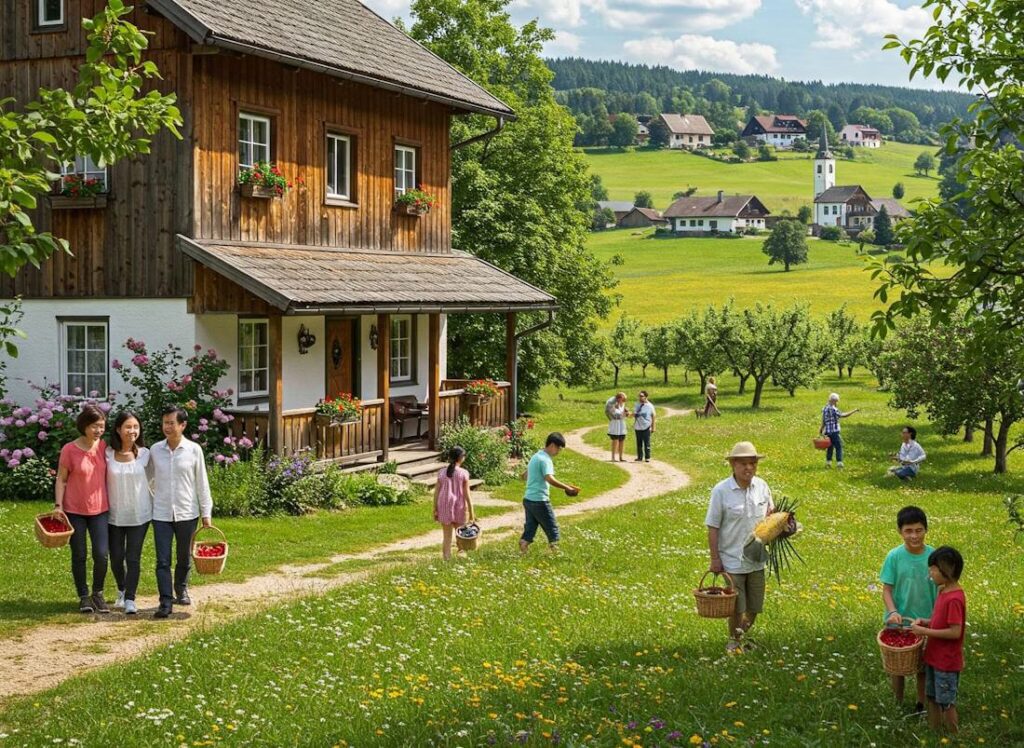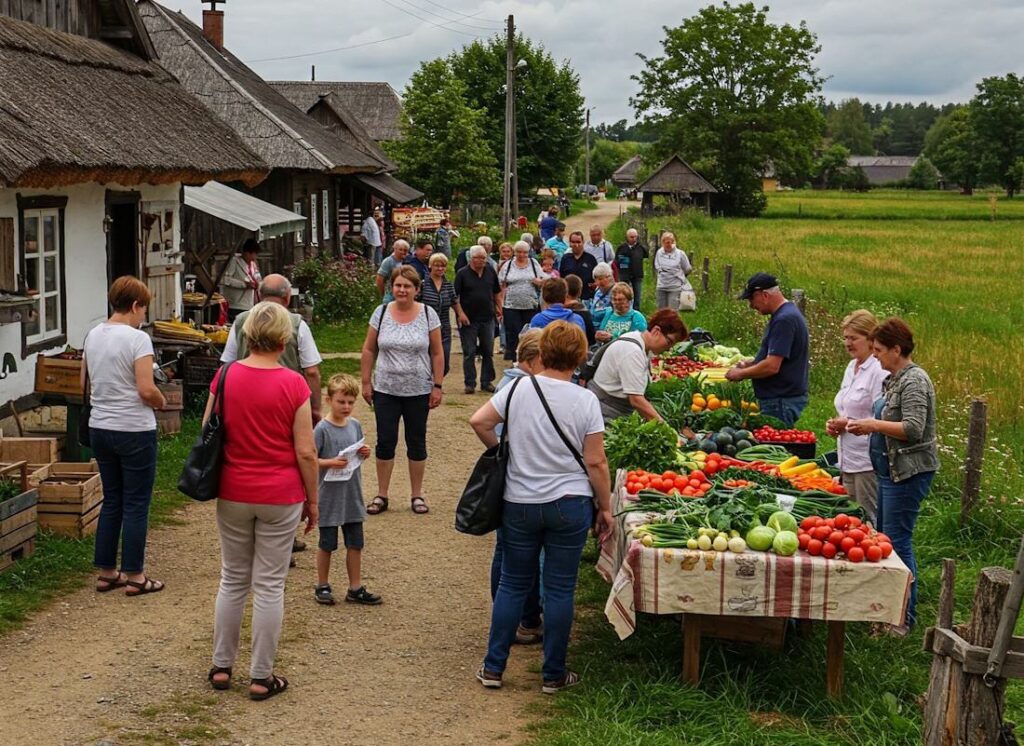Rural tourism encompasses a range of activities that invite visitors to experience and engage with farming, natural landscapes, and the distinctive cultures of rural areas. This growing sector of the travel industry emphasizes the allure of serene environments, providing an escape to those seeking sanctuary from bustling urban settings. In recent years, rural tourism has gained traction, becoming an appealing option for travelers looking for immersive experiences that foster connections with nature and local traditions.
The significance of rural tourism lies in its dual role as a catalyst for sustainable development and a means of preserving local cultural heritage. As urbanization continues to reshape demographics, many rural communities face economic challenges and population decline. By cultivating rural tourism opportunities, these communities can attract visitors, thereby stimulating local economies, creating jobs, and encouraging the stewardship of natural resources.
One of the key advantages of starting a rural tourism business is the opportunity to showcase a region’s unique identity and heritage. Guests may engage in activities such as farm stays, guided nature walks, or culinary experiences that highlight locally-sourced ingredients. This not only creates memorable experiences for tourists but also promotes the importance of conserving cultural landscapes and ecosystems.
Moreover, rural tourism fosters community involvement, encouraging local residents to take an active role in shaping tourism initiatives. This collaborative approach helps ensure that the benefits of tourism circulate within the community while maintaining the characteristics that differentiate rural areas from urban counterparts. The positive impacts of rural tourism extend beyond mere financial gains, inspiring pride among local residents and reinforcing the fabric of community life.
As the demand for authentic travel experiences continues to rise, those considering entering the rural tourism sector stand to play a pivotal role in both economic revitalization and cultural preservation within their regions.
Identifying Your Niche in Rural Tourism
Identifying a specific niche within the rural tourism market is crucial for the success of any tourism business. Several niches exist, including agritourism, eco-tourism, and adventure tourism, each offering unique experiences that cater to different audiences. To determine which niche aligns with your interests and market demand, it is essential to assess local resources, attractions, and community skills.
Begin by evaluating the natural and cultural resources available in your rural area. This includes scenic landscapes, wildlife, historical sites, and agricultural practices. For instance, if your community has a rich agricultural heritage, agritourism could be a beneficial avenue. This niche allows tourists to engage in farming activities, visit local farms, or participate in harvest festivals. Understanding the strengths of your local agriculture and how they can appeal to visitors will enhance your niche identification strategy.
Next, consider the potential for eco-tourism, which focuses on sustainability and environmental conservation. If your rural locale boasts untouched nature, wildlife habitats, or unique ecosystems, eco-tourism can attract visitors interested in hiking, birdwatching, and nature education. The viability of this niche hinges on your ability to promote responsible tourism practices while engaging visitors in meaningful experiences.
Adventure tourism represents another potential niche. Assess the outdoor activities available in your region, such as biking, kayaking, or rock climbing. Understanding your target audience’s interests in adventure sports can help tailor your offerings. Researching the demographic trends and preferences of tourists interested in outdoor experiences can inform your business model and marketing strategy.
Finally, engaging with your community is essential. Collaborate with local businesses, artisans, and tour guides to understand their skills and contributions, as they can complement your niche. Fostering partnerships will not only enrich your offerings but also reinforce community support for your rural tourism business.
Conducting Market Research
Establishing a rural tourism business necessitates a thorough understanding of the market environment. Conducting effective market research helps identify current trends, assess competition, and understand potential customer demographics. The initial step involves utilizing various tools and methods to gather relevant data that inform business strategies and decisions.
Surveys are one of the most common methods for collecting information directly from potential customers. They can be distributed online, through social media, or in person at local events. Crafting precise questions regarding preferences, travel habits, and interests in rural tourism activities can yield valuable insights. Online platforms such as SurveyMonkey or Google Forms facilitate easy distribution and data aggregation, making this method effective for rural tourism businesses.
In-depth interviews can also be instrumental in gathering qualitative data. Engaging with local residents, other tourism operators, or potential visitors can lead to a deeper understanding of market dynamics. Focus groups can be organized to offer a platform for discussion, helping identify key drivers that attract tourists to rural areas. These conversations provide nuanced perspectives that quantitative data alone may overlook.
Additionally, online research plays a critical role in identifying competitors and regional trends. Utilizing search engines and social media can reveal the marketing strategies and customer engagement tactics of existing rural tourism businesses. Analyzing online reviews on platforms such as TripAdvisor or Yelp can aid in understanding customer satisfaction levels and pinpointing service gaps that the new business can address.
Once the data is collected, it is essential to analyze it comprehensively. This analysis forms the basis for informed decision-making regarding pricing strategies, marketing plans, or unique offerings aimed at attracting potential customers. By effectively conducting market research, aspiring rural tourism entrepreneurs can position their business for success by aligning their offerings with market demands and customer expectations.
Creating a Business Plan
Developing a robust business plan is a crucial first step for anyone looking to establish a rural tourism business. This document serves as a roadmap, providing direction and clarity while addressing various essential components. The first item to consider is your mission statement, which encapsulates the purpose and values of your venture. A clear and compelling mission can attract customers and stakeholders alike, setting the tone for your brand.
Next, setting specific and measurable goals is vital for success. These objectives should include both short-term and long-term targets, allowing you to track progress and make necessary adjustments along the way. For instance, short-term goals might focus on establishing online presence and attracting initial customers, while long-term goals could pertain to expanding your offerings or developing partnerships with local businesses.
Outlining effective marketing strategies is another critical element of a business plan. In the context of rural tourism, your marketing approach may involve promoting unique local experiences, such as nature trails, farm stays, or cultural events. Utilizing digital marketing tactics, including social media, email campaigns, and search engine optimization, is essential to targeting potential customers effectively. Engaging with travel bloggers and influencers can also enhance your visibility in this niche market.
Last but not least, estimating financial projections is essential for understanding the economic viability of your venture. This includes forecasting both your startup costs and potential revenue. A detailed financial analysis can help you secure funding from investors or lenders who will be eager to see how you intend to generate a return on their investment. A well-structured business plan not only aids in attracting financial support but also guides you through the complexities of starting your rural tourism enterprise.
Legal Considerations and Permits
When embarking on a journey to establish a rural tourism business, it is imperative to understand and navigate the various legal considerations and permits that may be necessary. Starting any business, particularly within the tourism sector, requires compliance with a myriad of local, state, and federal regulations aimed at ensuring safety, environmental protection, and public health.
One of the first steps in launching a rural tourism venture is to investigate zoning regulations which dictate how land can be utilized in a particular area. Depending on the activities to be offered, such as lodging, recreational activities, or farm tours, different zoning classifications may apply. Engaging with local planning departments can provide clarity on whether the desired use of the property is permitted and what specific permits may be required. Failure to comply with zoning laws could lead to significant financial penalties or even the cessation of business operations.
Additionally, obtaining the appropriate licenses is crucial to ensure the legal operation of your rural tourism business. This may include general business licenses, sales tax permits, and specific permits related to hospitality and health services. Each jurisdiction may have unique requirements, so thorough research into local regulations is essential. Moreover, environmental laws that aim to safeguard the natural landscape and resources must also be considered, particularly for businesses operating in sensitive areas.
Health and safety codes are another vital concern. Compliance with these regulations is not only mandatory but is also critical for safeguarding both guests and the local community. Environmental assessments may be required to evaluate the impact of your business on the surrounding ecosystem. Failure to adhere to these rules can lead to legal repercussions and negatively tarnish the reputation of your rural tourism enterprise.
Therefore, understanding the legal landscape and prioritizing compliance with all regulations will ultimately facilitate a smoother launch and operation of your rural tourism business, enabling you to focus on delivering memorable experiences for your guests.
Developing Your Offerings
When embarking on a rural tourism business, the development of diverse offerings is fundamental to attracting visitors and ensuring their satisfaction. Rural tourism can encompass a wide range of experiences that highlight the unique aspects of the local environment, culture, and traditions. Creating an appealing array of activities and services is essential for appealing to various tourist demographics.
Accommodations play a pivotal role in enhancing the visitor experience. Options can range from quaint bed-and-breakfasts, charming cottages, to luxury retreats. Each accommodation type should reflect the character of the rural surroundings, providing travelers with a sense of place. Furthermore, integrating eco-friendly practices can attract environmentally-conscious tourists, offering them a chance to enjoy nature while contributing to its preservation.
Guided tours are another effective offering that can showcase the natural beauty and cultural heritage of the rural area. These tours can be crafted to vary in focus, from nature hikes and birdwatching to historical explorations of local landmarks. Engaging local guides can enrich the experience, as they provide authentic insights and stories that resonate with visitors.
Workshops also present an excellent opportunity to engage tourists in hands-on experiences that promote local crafts, farming techniques, or culinary arts. Such offerings not only educate visitors but also allow them to appreciate and learn from the skills rooted in the community. By involving local artisans or farmers, these workshops further enhance cultural authenticity, contributing to a deeper engagement with the destination.
Additionally, farm experiences such as fruit-picking, animal interactions, or farm-to-table meals can create memorable connections with the land. These activities not only immerse tourists in rural life but also create a sense of enjoyment and relaxation. By creatively combining these various offerings, rural tourism businesses can cultivate a unique identity that resonates with tourists, making them eager to explore and return.
Marketing Your Rural Tourism Business
Marketing a rural tourism business effectively requires a multi-faceted approach that enhances visibility and attracts potential visitors. One of the primary strategies is leveraging online platforms. With an increasing number of travelers turning to digital resources for planning their trips, establishing a strong online presence is paramount. A well-designed, user-friendly website serves as the cornerstone of this digital marketing effort. It should include essential information about accommodations, local attractions, and unique experiences that differentiate your offerings from competitors.
Social media is another powerful tool that can amplify your marketing efforts. Platforms such as Instagram, Facebook, and Twitter provide an excellent opportunity to engage with potential customers and showcase the beauty of rural settings. By sharing high-quality photos, engaging videos, and stories about local culture and experiences, you can effectively connect with your audience. Using relevant hashtags can also help increase your reach and attract a targeted demographic interested in rural tourism.
Collaboration with local tourism boards can further enhance your marketing strategy. These organizations often have established networks and resources that can be beneficial for promoting your rural tourism business. By participating in local events, tourism initiatives, or cooperative marketing campaigns, you can increase your visibility within the community and extend your reach to wider audiences.
Storytelling plays a significant role in attracting visitors to rural destinations. By sharing compelling narratives about the history, culture, and personal experiences associated with your location, you create a connection that resonates with potential travelers. Highlighting unique local experiences—such as agritourism, wildlife encounters, or traditional handicrafts—can further entice visitors and demonstrate the richness of the rural landscape.
Ultimately, a combination of online engagement, community collaboration, and authentic storytelling will lay a solid foundation for marketing your rural tourism business effectively, driving growth and profitability in a competitive landscape.
Building Partnerships with Local Communities
In the realm of rural tourism, establishing strong partnerships with local communities is instrumental in fostering a sustainable and authentic experience for visitors. Collaboration with local businesses, artisans, and service providers not only enhances the tourist offerings but also contributes significantly to the economic wellbeing of the community. By developing these relationships, tourism entrepreneurs can tap into the unique cultural resources and traditions that each locality has to offer, thereby enriching the overall experience for tourists.
One of the primary benefits of engaging with local communities is the opportunity to create a more personalized and immersive experience for visitors. Local artisans can provide handmade crafts, while service providers can offer authentic culinary experiences, traditional music, or guided tours that reflect the cultural heritage of the area. This not only appeals to tourists seeking genuine experiences but also helps to preserve local traditions and support artisanal skills.
Building effective partnerships begins with open communication and mutual respect. Tourism businesses should actively engage with local stakeholders through community meetings, workshops, or informal gatherings. Understanding the needs and aspirations of the local community can pave the way for collaborative projects that benefit both parties. For instance, a tour operator might collaborate with a local farm to create agritourism experiences, helping visitors learn about sustainable farming practices while providing the farm with additional income and exposure.
Moreover, creating a network of partnerships can amplify marketing efforts. Joint promotions, events, or packaged experiences not only diversify tourist offerings but also attract a wider audience. This cooperative approach allows local stakeholders to pool resources, share knowledge, and collectively address challenges that may arise. Ultimately, when rural tourism businesses prioritize community engagement, they contribute to a thriving tourism ecosystem that respects local culture while fostering economic resilience.
Conclusion and Future Trends in Rural Tourism
In summary, the exploration of rural tourism underscores its potential as a viable business venture. By leveraging the unique characteristics of rural areas, entrepreneurs can create memorable experiences that attract visitors seeking authentic engagements with nature and local culture. The key points discussed throughout this blog post highlight the importance of meticulous planning, understanding market trends, and building strong connections within the community. Each of these elements plays a crucial role in fostering a successful rural tourism business.
Looking towards future trends, sustainability stands out as a defining aspect of rural tourism. As consumers become more environmentally conscious, they increasingly favor businesses that demonstrate commitment to eco-friendly practices. This shift presents an opportunity for rural entrepreneurs to integrate sustainability into their offerings, enhancing appeal while contributing positively to local ecosystems. Additionally, with the rise of remote work, there is a growing inclination for individuals to seek out rural escapes that combine work and leisure. This trend allows for the development of specialized services, such as co-working spaces in serene environments, catering to this new demographic of travelers.
Furthermore, evolving tourist preferences indicate a shift towards experiences that offer personalization and community engagement. Tourists now seek deeper connections with destinations, favoring activities that allow them to immerse themselves in local traditions and lifestyles. By creating tailored experiences that resonate with these changing expectations, rural tourism operators can enhance visitor satisfaction and foster loyalty. Aspiring entrepreneurs are encouraged to embrace this journey, drawing inspiration from their beautiful surroundings and rich cultural heritage. Engaging with the community, being adaptive to trends, and maintaining a focus on sustainability will pave the way for a prosperous rural tourism business in the coming years.



